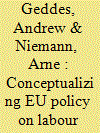|
|
|
Sort Order |
|
|
|
Items / Page
|
|
|
|
|
|
|
| Srl | Item |
| 1 |
ID:
142413


|
|
|
|
|
| Summary/Abstract |
This introduction sets the scene for the articles in this themed section. The starting point is the relatively recent but important developments that have occurred in the area of EU labour migration such as the 2009 ‘Blue Card’ directive covering highly qualified migrants, the 2011 single-permit directive covering residence and work, and a 2013 directive on seasonal workers. The article specifies the legal, policy and institutional developments in this area and discusses their significance. To facilitate reflection on the effects of these developments, the introduction focuses on underlying behavioural logics—that is, modes of action—that could account for the development of EU competencies and that then emerge as themes within the papers in this themed section. The first is an instrumental logic that focuses on the ways in which key actors pursue their interests.
|
|
|
|
|
|
|
|
|
|
|
|
|
|
|
|
| 2 |
ID:
135880


|
|
|
|
|
| Summary/Abstract |
Immigration politics in Britain have been transformed by high levels of immigration, the effects of EU free movement, strong anti-immigration sentiment and UKIP's rise. All are compounded by a more general discontent with politics and politicians. In face of claims that something must be done, politicians seek tougher controls on immigration and free movement, but these may be difficult to attain because of entanglement with EU rules, while failure to achieve stated objectives can further compound the disconnect that fuels support for UKIP.
|
|
|
|
|
|
|
|
|
|
|
|
|
|
|
|
| 3 |
ID:
066034


|
|
|
| 4 |
ID:
138873


|
|
|
|
|
| Summary/Abstract |
Links between security and migration are well established and are associated with the meaning, status, and practice of borders in the international political system. This article assesses how and with what effects the effects of environmental and climate change have entered this relationship between migration and security. It does so by assessing the EU’s external governance of migration in “South Mediterranean Partner Countries” (SMPCs): Algeria, Egypt, Iraq, Israel, Jordan, Libya, Morocco, Palestine, Syria, and Tunisia. It is argued that a focus on promoting “adaptation” and building “resilience” has developed that is consistent with the logic of governing migration from a distance. However, the article challenges ideas that environmental/climate change act as simple migration “triggers” and instead explores implications of movement towards and not away from risk, as well as the potential for populations to be trapped in areas that expose them to risk. It is shown that both have important implications for the relationship between migration, environmental/climate change, and security in SMPCs.
|
|
|
|
|
|
|
|
|
|
|
|
|
|
|
|
| 5 |
ID:
165564


|
|
|
|
|
| Summary/Abstract |
In this article, we consider the causes of the increase in voting for anti‐immigration parties in western Europe in the past decade. We first note that one of the most commonly assumed reasons for this increase is an associated increase in anti‐immigration sentiment, which we show is likely to be false. We also outline the major theoretical explanations, which we argue are likely to be incomplete. We then introduce our proposed explanation: these parties have benefitted from a sharp increase in the salience of immigration amongst some voters. We show that there are strong correlations over time between the salience of immigration and the polling of such parties in most western European countries. We argue that aspects of immigration in the last decade have activated pre‐existing opposition to immigration amongst a shrinking segment of the populations of western European states.
|
|
|
|
|
|
|
|
|
|
|
|
|
|
|
|
| 6 |
ID:
142414


|
|
|
|
|
| Summary/Abstract |
Increased interest and debate in Europe and at European Union (EU) level about the potential utility of ‘temporary’ and ‘circular’ forms of migration is accompanied by a certain elusiveness about the meaning of these terms. This elusiveness has actually created some opportunities for interactions at EU level to flesh out the meaning of these terms and inform policy development at member state and EU levels. By focusing on information gathering and the role of knowledge, the article develops a practice-based approach to analyse the relationship between research and policy, the role of the Commission and the activities of European Migration Network (EMN) in the quest for the meaning of temporary and circular migration. Information gathering and knowledge creation at EU level are shown to serve instrumental purposes by informing policy choices (‘evidence-based policymaking’) but it is also shown that existing policy choices cast a long shadow, shaping the context within which knowledge is developed (policy-based evidence-making), while information gathering and knowledge development can legitimate institutional roles, such as the Commission (policy-based institution-building).
|
|
|
|
|
|
|
|
|
|
|
|
|
|
|
|
|
|
|
|
|